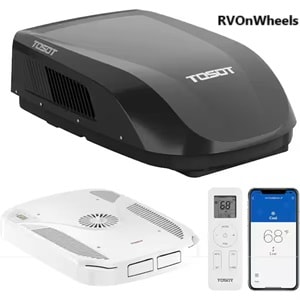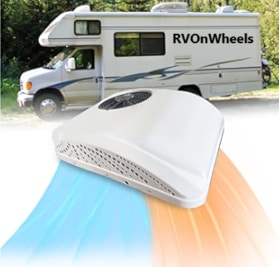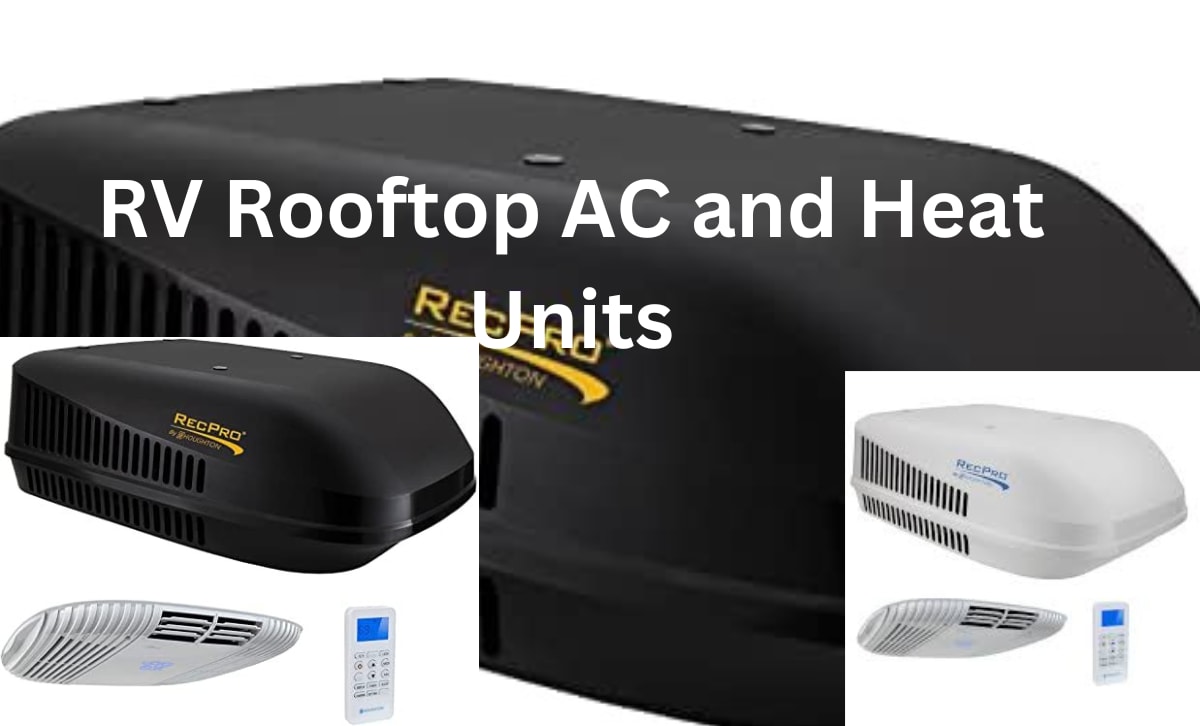Are you looking for the top RV rooftop AC and heat units? Discover what factors you should consider to make an informed choice!
Modern RVs often come with HVAC (Heating, Ventilation, and Air Conditioning) systems that provide both heating and cooling. These systems are more expensive than the standard ones but provide year-round comfort and convenience. Many brands are on the market, but several factors must be considered before buying an RV HVAC system.
Here, we will share detailed information about the HVAC systems and explain their typical issues. Moreover, we will share the 3 best rooftop AC brands at the end to make your search easy. Let’s quickly get into the details of this guide.
How RV Rooftop AC And Heat Units Work?
An RV HVAC is an essential component of your RV. It ensures comfort during long travels. Whether summer or winter, these ACs will provide heating and cooling accordingly. It keeps your RV interior climate just the way you want. Unlike traditional home HVAC systems, RV HVAC is efficient, lightweight, and capable of working under various weather conditions.
An RV HVAC system consists of several components; let’s start by discussing their functions and how they work.
RV Furnace And Heat Pump
The majority of modern RV air conditioning units are equipped with heaters. Most RVs use propane furnaces for heating, while some are equipped with heat pumps. The main difference is that furnaces run on propane, while heat pumps run on electricity. Heat pumps can handle temperatures up to certain degrees. When it gets hugely colder, it struggles to maintain the temperature inside.
On the other hand, furnace heaters work efficiently in colder climates. It warms the air using propane fuel. A fan then pushes the warm air through the vents, keeping the inside of the RV nice and warm.
RV Air Conditioner
Modern Acs uses a chemical called refrigerant to cool. Refrigerants help in reducing the temperature of hot air. An AC picks up the hot air inside the RV through air vents and runs the air over the evaporator coils with refrigerators inside them.
When the refrigerant warms up, it turns from liquid state to gaseous. The unit uses a compressor to convert the gas into liquid, releasing the heat it has absorbed. The released air blows out of the RV. The cool air is sent back to the RV, reducing the temperature inside your RV.
Understanding how your RV AC works is crucial, but choosing the suitable unit involves considering several key factors to ensure optimal performance and comfort.
Factors To Consider While Choosing The Right RV Rooftop AC With Heat Pump
An RV AC with heat pump is essential for a long adventure. Whether blazing 102-degree heat or cold, the proper RV AC and heat unit will ensure you won’t feel the extreme outdoor temperatures.
There are many options, but how do you know what to choose? It would help if you considered several factors when choosing the best AC and heat unit for your RV.
Size of Your RV
The size of the RV is an essential factor while choosing among RV rooftop AC and heat units. RV comes in all sizes, from small campers to large motorhomes and trailers. Each requires a specific type of cooling and heating system.
For example, if you’re RV is less spacious, then a single small rooftop AC with a heat pump is enough for you. But that’s not the case with large motorhomes; they require at least two or more units to cool the entire space.
Power Requirements
The next important factor when choosing RV air conditioner with a heat pump is its power requirements. The power needs might vary from model to model. Hence, it is better to ensure that your RV electrical system can handle that load.
Noise Level
While traveling, an RVer needs peace, and a noisy AC can disturb it. It’s better to choose an AC which operates quietly. Some models come with noise-reducing technology that reduces AC noise. Keep this in mind when buying a new unit for your RV.
Energy Efficiency
Energy efficiency is another essential factor to consider. You don’t want to spend hefty amounts on fuel costs. Look for models that have SEER ratings. The higher the ratings, the more efficient the unit. Read our guide “Can You Run AC With Solar Power In RV?” if you are looking for energy efficient solutions.
Price Range
The prices of RV air conditioning units with heat pumps vary depending on their size, power requirements, and features. Looking for an AC that meets your requirements and fits your budget is better. You can find many AC units on Amazon and compare their features and prices to see which suits you.
These were essential factors to consider before buying an RV AC. Let’s dive into the top 3 RV Rooftop ACS and heat units.
Top 3 RV Rooftop AC and Heat Units
Are you looking for the best RV AC With Heat Pump? If yes, these are some excellent options available in the market. Below are the three best units currently. We picked these units based explicitly on various factors, including durability, ease of installation, value, and noise level.
RecPro RV Air Conditioner 15K
This unit offers powerful cooling power with a 15,000 BTU capacity, ensuring your RV stays comfortably cool even in extreme heat.
TOSOT GO COOL RV Air Conditioner 15000 BTU

It is one one of my favorite RV rooftop AC and heat units. This unit is designed for high performance and delivers powerful cooling with very less noise. It’s a reliable option for maintaining a comfortable climate in your RV during hot weather.
BALIGO RV Rooftop 12V Air Conditioner with Heat

Baligo RV Rooftop is a powerful 12V unit that provides both cooling and heating. This AC is ideal for various weather conditions and is also very energy-efficient. This AC has a sleek design and compact size making it perfect for small to medium RVs.
.These top three RV AC and heat units are excellent choices to keep your RV comfortable. They ensure optimal performance and energy efficiency for your adventures.
How To Install RV Rooftop AC With Heat Unit?
You already spent a lot on your RV AC; now, you don’t want to spend on installation. It is possible to install the RV rooftop AC and heat units yourself. The instructions for installing an RV unit depend on your chosen brand and model. Check the manual to see proper instructions. However, these are some general instructions for installing an AC unit.
- First of all, remove the old AC unit. If the RV didn’t have an AC, you’d need to create a Vent to hold the AC unit.
- Before removing an old unit, be sure to get all the screws, make sure the new ac gets a waterproof space.
- Ensure the existing wires match the new AC’s requirements.
- Please avoid using the AC’s exterior shroud to lift it. Even smaller Acs weigh up to 100 tons and should be lifted from the bottom.
- While aligning the AC with the vent opening, ensure it’s facing the right direction. The sloped part of the AC should face the front of the RV.
Once the installation is complete and everything is aligned correctly, you can enjoy the comfort of your RV rooftop AC and heat unit, and if any issues arise, you’ll be prepared to handle them with the following troubleshooting tips.
Troubleshooting Common RV HVAC Issues
It’s common to face issues with your RV HVAC units. However, it’s not something concerning. These issues are easy to fix, and you can fix them with some essential troubleshooting tips. Below are the most common AC issues and how to resolve them.
Thermostat Problems
If there’s an issue with AC’s heating and cooling, there might be a problem with the thermostat. Check whether the thermostat is battery operated; the battery wears out over time and needs replacement. But, if it’s electrically wired, the issue is more likely to be local to the thermostat rather than within the RV AC heating and cooling system.
Furnace Motor Won’t Run
There is likely an electrical issue if the furnace motor isn’t starting. Inspect the furnace fuse. If the fuse has burned out, install a new fuse of the same type and see if it works. If the fuse is working fine, then there’s an issue with the thermostat, module board or motor itself. It’s better to call a professional when you are facing this condition for RV rooftop AC and heat units.
Furnace Won’t Light
Most of the time, your blower is processing properly, but the furnace is not glowing. The most common reasons for this problem are Critters, a harmful gas valve, and a lousy igniter placement.
RV furnaces attract bugs, so it is usually seen that the bugs nest themselves near the RV furnace and sometimes into the gas tubes and combustion chambers. So, it is necessary to clean the RV Furnace.
AC Is Blowing Warm Air
Test the compressor using a multimeter if your AC is blowing warm air. If the testing is terrible, unfortunately, there is no option other than replacing the entire AC unit. If the result shows the compressor is OK, then the capacitor could be causing the problem. Discharge the capacitor and test it through the multimeter. Luckily, replacing a capacitor is possible, and it isn’t costly.
These are some common issues with RV HVAC systems and their troubleshooting tips.
RV Rooftop AC and Heat Units Maintenance Tips
Maintenance is an essential part of keeping the RV AC and heat unit running for a longer time. It ensures that your AC keeps running while you are on a long road trip. It would help if you remembered a few things about maintaining the RV AC unit.
Filter Changes
Changing the filters once every month during the summer and before the start and end of every season is recommended. Filters often get caught up with dust and debris; replacing the old filter improves the efficiency of your RV rooftop AC and heat units.
Checking The Coils
Inspect the coils located outside of your RV. Over time, the coils can catch dirt, debris and small insects, leading to reduced cooling and heating of the AC unit. Carefully clean the coils with a soft brush to avoid any damage. Also, look for any bents in the coils; use a fin comb tool to straighten them if found.
Watching For Leaks
Look for leaks around the unit. Leaks can cause water damage, which requires costly repairs. If you see water coming out, tighten the bolts using a screwdriver. Seal any openings with a sealant to avoid leaks.
These are the few tips that’ll make sure your RV HVAC runs efficiently for a longer time span.
Benefits Of Installing RV Rooftop AC and Heat Units
Rooftop Ac offers distinct advantages you won’t find in every cooling system. They offer comfort with their improved cooling and heating capabilities. They ensure the interior temperature of the RV remains nice and according to your requirements. Let’s explore some of the benefits of the rooftop AC and heat unit.
Versatility
Rooftop AC and heat units offer both cooling and heating functionalities making it an verstalie AC unit, providing comfort regardless of the weather.
Saves Space
RV rooftop AC and heat units are installed on the roof, and free up valuable interior space, allowing for more living area inside the RV.
Quieter Operation
Rooftop units are often quieter than the standard AC units since the compressor and other noisy components are installed outside.
Final Words
This was all about “RV rooftop AC and Heat Units”. We hope you found what you were looking for. This research is based on personal experience and customers around the USA. A rooftop AC comes with benefits as well as special maintenance requirements.
Choose an AC with a higher SEER rating. Carefully consider your requirements and RV size before buying one. We have also shared some of the best RV rooftop units; if you are also using any of these brands, remember to share your experience with us in the comment section.
FAQs
Do RV AC Units Have Heat?
It depends on the type of model you are buying. Most Rooftop RV ACs come with a built-in heat pump. Heat Pumps warm the interior of the RV quickly. However, it can’t handle extreme cold. Below 45 c, it is recommended to use a propane-powered furnace.
How Does An RV Rooftop Ac Work?
RV rooftop AC removes the hot air from the inside and moves it to the evaporator coils where the refrigerants are stored. The refrigerant absorbs the heat and turns it into gas. The unit compresses the gas to a liquid, releasing the hot air outside while the cooled air is blown inside.
How Many Watts Is A Roof Top RV Ac?
A Rooftop rooftop RV RV ACndepende model and their cost capacity. On average, most rooftop air conditioners consume around 1200 to 1800 watts. If you want to find out the exact amount of watts your AC consumes, look at Ramsond. Here, you’ll find a complete wattage chart.

